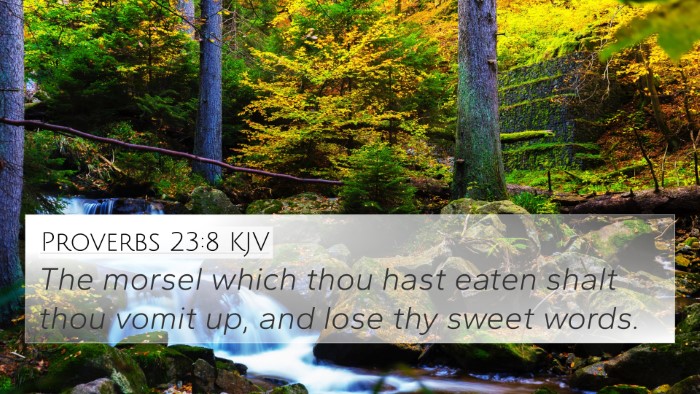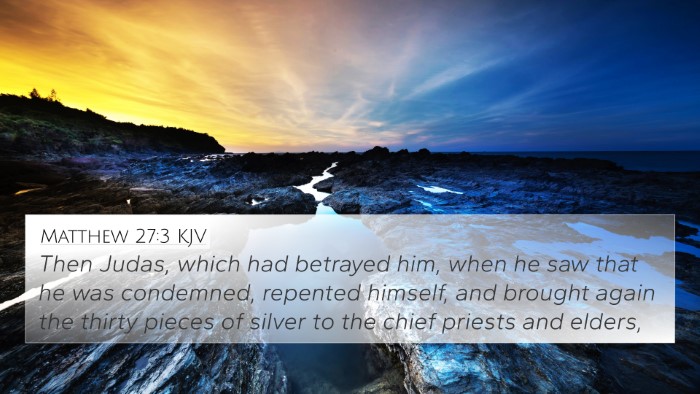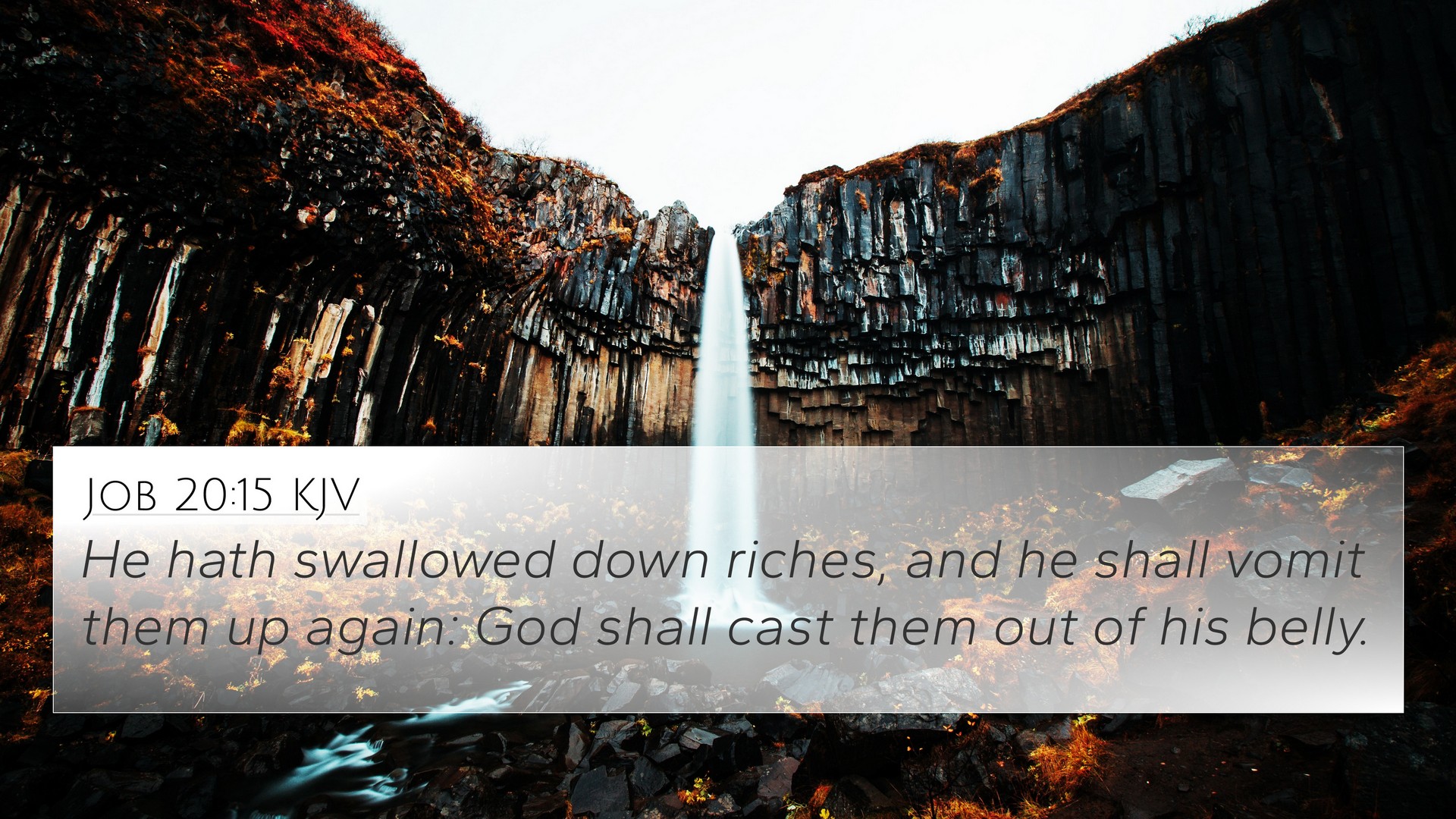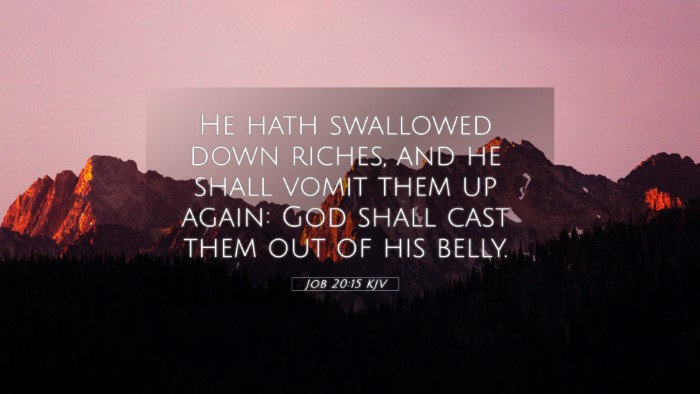Old Testament
Genesis Exodus Leviticus Numbers Deuteronomy Joshua Judges Ruth 1 Samuel 2 Samuel 1 Kings 2 Kings 1 Chronicles 2 Chronicles Ezra Nehemiah Esther Job Psalms Proverbs Ecclesiastes Song of Solomon Isaiah Jeremiah Lamentations Ezekiel Daniel Hosea Joel Amos Obadiah Jonah Micah Nahum Habakkuk Zephaniah Haggai Zechariah MalachiJob 20:15 Similar Verses
Job 20:15 Cross References
He hath swallowed down riches, and he shall vomit them up again: God shall cast them out of his belly.
Uncover the Rich Themes and Topics of This Bible Verse
Listed below are the Bible themes associated with Job 20:15. We invite you to explore each theme to gain deeper insights into the Scriptures.
Job 20:15 Cross Reference Verses
This section features a detailed cross-reference designed to enrich your understanding of the Scriptures. Below, you will find carefully selected verses that echo the themes and teachings related to Job 20:15 KJV. Click on any image to explore detailed analyses of related Bible verses and uncover deeper theological insights.

Proverbs 23:8 (KJV) »
The morsel which thou hast eaten shalt thou vomit up, and lose thy sweet words.

Matthew 27:3 (KJV) »
Then Judas, which had betrayed him, when he saw that he was condemned, repented himself, and brought again the thirty pieces of silver to the chief priests and elders,
Job 20:15 Verse Analysis and Similar Verses
Understanding Job 20:15
Job 20:15 states: "He hath swallowed down riches, and he shall vomit them up again: God shall cast them out of his belly." This verse provides profound insights into the consequences of greed and the transient nature of material wealth. The verse is spoken by Zophar, one of Job’s friends, as he attempts to explain Job's suffering by connecting it to the fate of the wicked.
This summary draws upon the insights of renowned public domain commentaries, including those by Matthew Henry, Albert Barnes, and Adam Clarke.
Verse Meaning
The core message of Job 20:15 revolves around the notion that the wicked may experience temporary wealth, but ultimately, it will lead to their downfall. Here are some key interpretations:
- Temporary Wealth: Matthew Henry emphasizes that material riches can be deceptive and illusory, showing that the accumulation of wealth does not guarantee lasting security or happiness.
- Divine Justice: Albert Barnes notes that God’s justice prevails in the end, indicating that any ill-gotten gains will be returned as punishment rather than benefit.
- Symbol of Destruction: Adam Clarke elaborates on the imagery of “vomiting,” symbolizing that wealth acquired through wrongful means will ultimately cause the sinner’s own destruction.
Cross-References
Here are 10 biblical cross-references that relate to Job 20:15, enhancing our understanding of its themes:
- Proverbs 11:4: "Riches profit not in the day of wrath: but righteousness delivereth from death."
- Proverbs 23:4-5: "Labour not to be rich: cease from thine own wisdom. Wilt thou set thine eyes upon that which is not? For riches certainly make themselves wings; they fly away as an eagle toward heaven."
- Ecclesiastes 5:10: "He that loveth silver shall not be satisfied with silver; nor he that loveth abundance with increase: this is also vanity."
- Psalms 37:16: "A little that a righteous man hath is better than the riches of many wicked."
- Mark 8:36: "For what shall it profit a man, if he shall gain the whole world, and lose his own soul?"
- Luke 16:19-25: The parable of the rich man and Lazarus that illustrates the reversal of fortunes in the afterlife.
- 1 Timothy 6:9-10: "But they that will be rich fall into temptation and a snare, and into many foolish and hurtful lusts, which drown men in destruction and perdition."
- James 5:1-3: "Go to now, ye rich men, weep and howl for your miseries that shall come upon you."
- Proverbs 28:20: "A faithful man shall abound with blessings: but he that maketh haste to be rich shall not be innocent."
- Habakkuk 2:9: "Woe to him that coveteth an evil covetousness to his house, that he may set his nest on high, that he may be delivered from the power of evil!"
Thematic Connections
Job 20:15 is part of a larger dialogue concerning suffering, justice, and the perils of wealth. Several themes emerge:
- The Illusion of Wealth: Throughout Proverbs and Ecclesiastes, the Bible highlights the fleeting nature of riches.
- Suffering and Retribution: The Book of Job often addresses the question of human suffering and divine justice, which is echoed in the New Testament.
Conclusion
In conclusion, Job 20:15 serves as a stern warning against the pursuit of wealth at the cost of righteousness. By utilizing tools for cross-referencing, individuals can uncover the rich thematic connections between this verse and others, deepening their understanding of biblical teachings.
If you're studying how to find cross-references in the Bible, consider this verse as a foundational point in exploring the interconnected wisdom of scripture.


